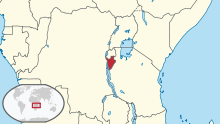
Quick Facts

Biography
General Michel Micombero (c.1940–1983) was a Burundian politician and soldier who ruled the country as its first President and de facto dictator for the decade between 1966 and 1976. Micombero was a member of the Tutsi ethnic group.
Beginning his career as an officer in the Burundian army, Micombero studied in Belgium and rose to prominence for his role in helping to foil an attempted coup d'état in October 1965 where ethnic Hutu soldiers attempted to overthrow the country's (Tutsi) monarchy. After becoming Prime Minister in July 1966, Micombero lead two further coup d'états against the monarchy, which he perceived as too moderate, and the installation of himself as President in November 1966. As President, Micombero ruled Burundi as a military dictator. He led a one-party state which centralised the country's institutions and adapted political ideologies from other countries in the region. Dissent was repressed and, in 1972, an attempt to challenge Micombero's power led to a genocide against the Hutu population in which around 100,000 people, mainly Hutu, were killed. His regime finally collapsed in 1976 when he was ousted in a coup d'état by Jean-Baptiste Bagaza. He went into exile in Somalia and died in 1983.
Biography
Background and rise to power
Micombero was born in Rutovu, Bururi Province in Belgian-ruled Ruanda-Urundi in 1940. His parents were peasants from the Hema people, part of the Tutsi ethnic group. Micombero studied at Catholic mission schools in Burundi and, in 1960, joined the Burundian military which was being formed ahead of planned independence in 1962. As part of his training, he was sent to study at the Royal Military Academy in Brussels, Belgium to train as an officer. At the time of the independence of the Kingdom of Burundi in July 1962, he held the rank of captain.
In early post-independence Burundi, the Tutsi-dominated monarchy of Mwambutsa IV attempted to balance the interests of Tutsi with those of the Hutu majority. In 1963, Micombero joined the ruling Union for National Progress (UPRONA) party which, though dominated by Tutsi, also tried to attract Hutu members. In June, Micombero was named State Secretary for Defense, making him head of the military at the age of 23. In October 1965, a group of ethnic Hutus attempted to overthrow the Burundian monarchy. Their attempt, though unsuccessful, led to Mwambutsa IV fleeing into exile. Micombero led the repression against the coup's perpetrators. In July 1966, a second coup d'état brought the king's son, Ntare V, to power and suspended the national constitution. However, when Ntare was on a state visit to the neighbouring Republic of the Congo in November 1966, a third coup d'état abolished the monarchy and a republic was proclaimed on 28 November. As a colonel, Micombero took power as the country's first President in December 1966.
Dictatorship

As President of Burundi, Micombero ruled through UPRONA as a one-party state. His ideology of "democratic centralism" brought all the country's institutions and media under the regime's control. His regime combined ideas from the socialist ideology of Tanzania with others from Joseph-Désiré Mobutu's regime in the Congo. As a Cold War leader, he was able to play off both Communist and Western powers against one another.
He became increasingly paranoid after suffering an injury in a road accident in 1967. He was believed to be an alcoholic. Various plots against the regime were discovered and unrest remained. Micombero's support became increasingly localised to Tutsi in the northern and central regions of Burundi.
In April 1972, a major rebellion broke out among the Hutu in the south at the encouragement of the Tanzanian regime. In subsequent ethnic violence, as many as 1,000 Tutsi were killed. The reaction of the Micombero regime was to launch a genocidal campaign against the Hutu in the region in which around 100,000 people are thought to have been killed. The deposed king Ntare, said to have led the rebellion, was murdered. In 1973, after further violence, the Congolese Mobutu regime had to intervene to prevent Tanzanian invasion. Following the end of the crisis, Micombero introduced a new constitution allowing him to run for a further seven-year term. He also laid the foundation for the Economic Community of the Great Lakes Countries the same year, along with the governments of Rwanda and Congo.
In November 1976, opponents of Micombero's regime, led by Colonel Jean-Baptiste Bagaza, led a successful coup d'état. Micombero himself was arrested and a second republic was declared under the dictatorship of Bagaza which would last until 1987.
Exile and death
Micombero was exiled from Burundi in 1977. He took up residence in Somalia, then ruled by dictator Siad Barre who was a close friend. He gained a degree in economics from the University of Somalia in 1982. He died of a heart attack in 1983.
